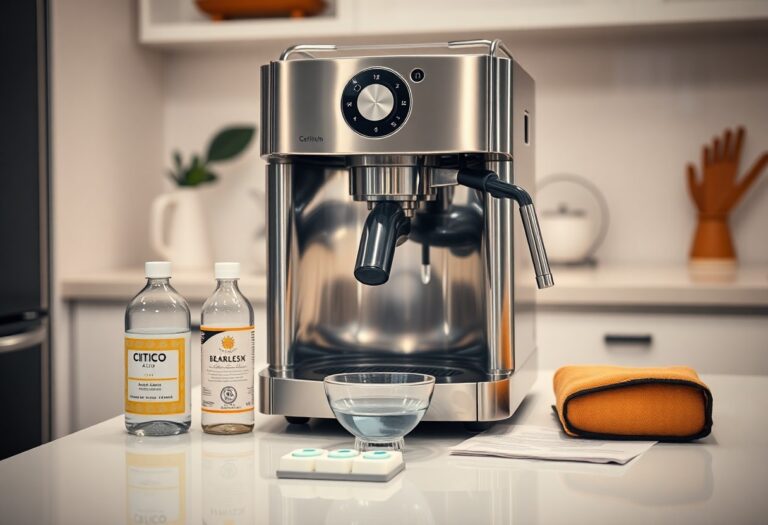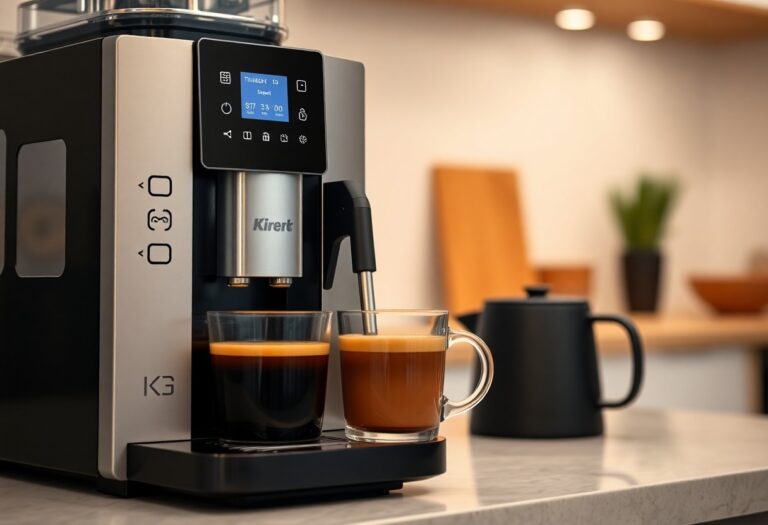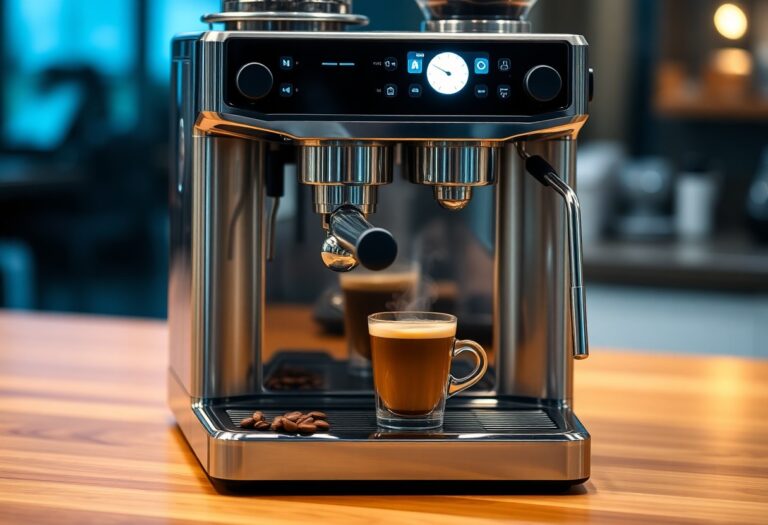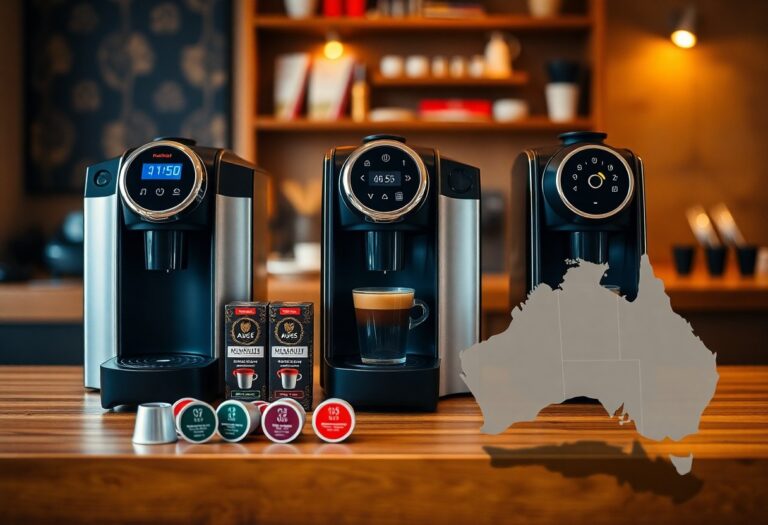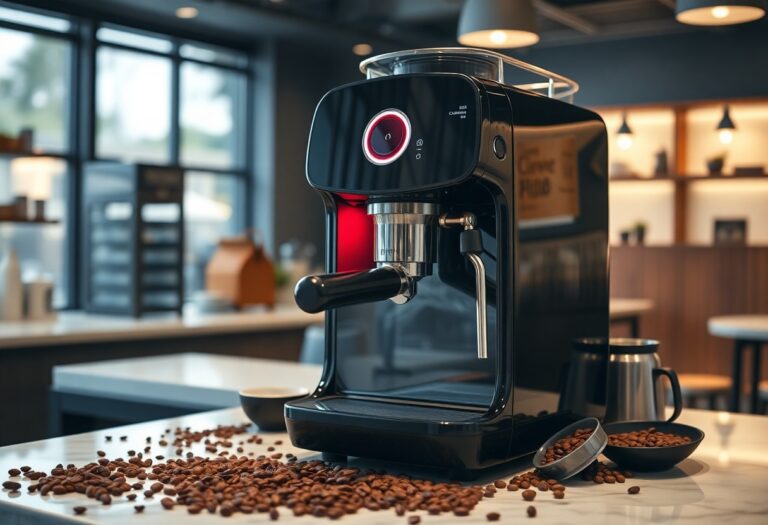What is Water Hardness in a Coffee Machine – Mineral Content
Hardness in water refers to the concentration of mineral content, primarily calcium and magnesium, which can significantly affect your coffee brewing experience. If your water is too hard, it can lead to scale buildup in your coffee machine, impacting its efficiency and lifespan. On the other hand, water that’s too soft might result in a bland or flat tasting brew. Understanding your water’s composition is necessary for optimal flavor and longevity of your equipment. For an in-depth exploration, check out information on Water Hardness.
Over time, you may have noticed that your coffee doesn’t taste as good as it used to. This can often be due to water hardness in your coffee machine, which refers to the level of minerals, such as calcium and magnesium, present in the water you use. High water hardness can lead to scale buildup in your machine, affecting its performance and the flavor of your brew. In this post, you’ll learn how to assess water hardness, its impact on your coffee, and what you can do to ensure your machine operates efficiently.
Key Takeaways:
- Water hardness in a coffee machine refers to the concentration of minerals, primarily calcium and magnesium, present in the water used for brewing.
- High water hardness can lead to scale buildup inside the machine, affecting its performance and lifespan.
- Soft water, which has low mineral content, can enhance the extraction of flavors and aromas from coffee grounds, resulting in a better-tasting cup.
- Regular maintenance, including descaling, is important for coffee machines to manage water hardness and prolong the life of the equipment.
- Using water with balanced hardness levels can optimize coffee extraction while minimizing harmful scale formation.
Key Takeaways:
- Water hardness is determined by the concentration of minerals, primarily calcium and magnesium, in the water used in coffee machines.
- Soft water contains low levels of these minerals, while hard water has higher concentrations, which can affect the extraction of coffee flavors and aromas.
- High mineral content in water can lead to scale buildup inside coffee machines, decreasing performance and increasing maintenance needs.
- Understanding the hardness of your water can help in selecting the best coffee machine or water treatment methods to ensure optimal coffee brewing.
- Testing kits or. water quality reports can be utilized to measure water hardness and to take necessary steps for improvement.

The Chemistry of Water: Unpacking Hardness
Water hardness primarily stems from the presence of dissolved minerals in your tap water. These minerals, mainly calcium and magnesium, affect not only the flavor of your coffee but also the functionality of your coffee machine. Hard water can lead to limescale buildup, which obstructs the brewing process and reduces the lifespan of your equipment. Understanding the chemistry behind water hardness equips you to make informed choices about your coffee and maintenance practices.
Defining Water Hardness: Minerals at Play
Water hardness is defined by the concentration of calcium and magnesium ions. These minerals originate from the natural rock and soil that water interacts with as it travels to our taps. The measurement typically spans from soft (0-60 mg/L) to very hard (over 180 mg/L). As a rules of thumb, water with high mineral content can significantly impact brewing outcomes, leading to a richer or more bitter flavor profile.
The Role of Calcium and Magnesium in Brewing
Calcium and magnesium play vital roles in the extraction process during brewing. Having an optimal concentration not only enhances flavor but also stabilizes the brewing system. Calcium ion levels in the range of 30-50 mg/L contribute positively by increasing the solubility of coffee compounds, thus ensuring a well-balanced cup. Magnesium, on the other hand, adds depth to the flavor profile, promoting the extraction of aromatic oils and acidic components important for a delightful brew.
In brewing, calcium’s presence helps facilitate the Maillard reaction, which is responsible for the desirable brown color and complex flavors in your coffee. Magnesium contributes to the overall mouthfeel, enhancing body without overwhelming the palate. Water with too much calcium can lead to excessively bitter coffee, while insufficient levels may result in under-extraction, producing a weak beverage. Finding the right balance then is key to enjoying the best flavor profile your beans have to offer.
The Chemistry of Water Hardness
Water hardness primarily stems from the concentration of specific minerals, notably calcium and magnesium. These minerals dissolve in water while it flows through soil and rocks, contributing to its overall hardness. Your coffee machine interacts with hard water, which can lead to mineral buildup, affecting both machine performance and coffee quality. Monitoring these mineral levels is important for optimal extraction and flavor, ensuring your daily brew remains delightful.
Defining Hardness: Calcium and Magnesium Levels
Hardness in water is typically measured in parts per million (ppm), with calcium and magnesium being the primary contributors. For instance, water is classified as soft at 0-60 ppm, moderately hard at 61-120 ppm, hard at 121-180 ppm, and very hard anything over 180 ppm. As these levels increase, so does the likelihood of mineral deposits forming in your coffee machine, which can impact taste and appliance longevity.
The Role of Water pH in Coffee Brewing
The pH level of your water influences how effectively its minerals extract flavors from coffee grounds. Ideally, water used for brewing should have a pH between 6.5 and 7.5. If your water is too acidic (pH below 6.5), it can enhance bitterness and mask the coffee’s natural sweetness. Conversely, overly alkaline water (pH above 7.5) may result in a flat tasting brew, as it can negatively affect the extraction process. This balance is key to achieving a rich, flavorful cup of coffee.

The Impact of Hardness on Coffee Extraction
Water hardness significantly influences how well coffee flavors extract during brewing. Harder water, rich in minerals, can enhance extraction efficiency but can also lead to over-extraction or bitterness if not balanced correctly. You may notice that different levels of hardness can produce varying flavor profiles and aromas in your cup. Finding the sweet spot in mineral content is imperative to achieving that perfect brew.
How Hard Water Affects Flavor Profiles
Hard water often results in a bolder, more robust flavor, but it can also mask subtle tasting notes in lighter roasts. The high mineral content can overpower delicate flavors, leading to a cup that tastes flat or overly bitter. By adjusting the hardness of your brewing water, you can enhance or mute certain flavors to suit your palate.
The Science Behind Extraction Efficiency
The ratio of calcium and magnesium to other minerals determines how effectively your coffee grounds release flavor compounds during brewing. Studies show that water with a balanced hardness level, around 70-150 mg/L, optimizes extraction. At this level, you achieve a fuller body and aroma without compromising the nuanced flavor characteristics of the coffee.
This balance stems from the concept of solubility; minerals play a role in dissolving caffeine and other soluble oils that contribute to flavor. For instance, calcium aids in the extraction of beneficial acids, while magnesium enhances the overall mouthfeel and complexity. If you use very soft water, the extraction may become inefficient, leading to a weak cup lacking depth. Conversely, extremely hard water could overwhelm the palate, causing you to miss out on specific notes. Maintaining an ideal hardness can, therefore, transform your coffee experience from average to extraordinary.
How Water Hardness Impacts Coffee Extraction
Your coffee brewing process is profoundly influenced by the hardness of your water. High mineral content can lead to over-extraction, producing bitter flavors, while soft water may result in under-extraction, leaving your brew weak and flat. The delicate balance is necessary to unlock the full potential of coffee flavors. By optimizing your water hardness, you can enhance the extraction process, allowing the natural characteristics of your coffee beans to shine through. For more insights, check out Coffee water – what to watch out for.
The Relationship Between Mineral Content and Flavor Profile
Minerals in water, such as magnesium and calcium, play a significant role in shaping your coffee’s flavor profile. These minerals help dissolve the aromatic compounds found in coffee, enhancing the overall taste. If your water lacks sufficient mineral content, the vibrant flavors of your coffee may become muted, resulting in a less enjoyable experience. Balancing these minerals helps create a more complex and rich cup of coffee that reflects the unique notes of your beans.
The Science of Coffee Solubility and Hardness
Solubility in coffee is influenced by the interaction between temperature, time, and the mineral content of your water. Optimal solubility ensures that desirable compounds are extracted while unpleasant elements are minimized. When your water is too hard, certain flavors can be overly extracted, leading to a pronounced bitterness. Conversely, soft water may fail to extract the full spectrum of flavors, causing your coffee to lack depth and body. Fine-tuning your water hardness is vital for the ideal brew.
Understanding this dynamic requires delving into chemistry. The presence of calcium and magnesium assists in dissolving oils and organic acids, crucial for flavor development. If your water is excessively hard, the coffee particles can clump together, inhibiting proper extraction. Likewise, if the water is too soft, it can struggle to adequately extract soluble compounds, leaving your coffee tasting underwhelming. Striking the right balance in mineral content is, therefore, key to unlocking the full spectrum of flavors and aromas in your cup.
Water Hardness and Coffee Machine Longevity
The longevity of your coffee machine is directly affected by water hardness. High concentrations of minerals can lead to scale buildup, which poses significant risks to the internal components of your machine, ultimately leading to malfunctions or reduced efficiency. Ensuring that your machine operates in a lower hardness environment helps maintain optimal performance, allowing you to enjoy your favorite brews while extending the life of your equipment.
The Corrosive Nature of Hard Water
Hard water can be corrosive, causing various issues within your coffee machine. The minerals like calcium and magnesium can accumulate and form scale, clogging critical parts and leading to decreased operational efficiency. Over time, this buildup can even lead to costly repairs and replacements, meaning an untreated water source may ultimately shorten your machine’s lifespan.
Preventive Measures for Machine Maintenance
Implementing preventive measures is vital for maintaining your coffee machine in the face of hard water challenges. Regular descaling, using water softeners, or installing filtration systems can mitigate the adverse effects of mineral buildup. Such strategies not only enhance the machine’s performance but also ensure the integrity of your coffee’s flavor profile remains intact.
Invest in regular maintenance routines to protect your machine against hard water effects. Descaling should be performed every three to six months, depending on your water hardness level and the frequency of use. Consider utilizing specialized descaling solutions designed for your coffee maker, as they effectively dissolve mineral deposits. Additionally, using filtered or softened water can significantly reduce scale formation, thus preserving the coffee machine’s components, improving efficiency, and enhancing the overall taste of your coffee. Keeping an eye on your machine’s operating indicators can also help catch early signs of buildup, allowing for timely intervention.
Identifying Water Hardness in Your Coffee Machine
Determining the hardness of the water used in your coffee machine is crucial for optimizing flavor and ensuring the longevity of your equipment. You can assess water hardness using various methods, including testing strips, which provide a quick estimate, or more sophisticated digital testers that give precise readings. Regular checks will help maintain your coffee’s quality and your machine’s performance.
Testing Methods: Home Kits vs. Professional Analysis
Home testing kits for water hardness are convenient and user-friendly, allowing you to assess your water’s mineral content quickly. These kits typically involve simple color-change strips or drops, which indicate the hardness level based on a scale. For a more accurate assessment, consider consulting a professional water analysis service that can deliver detailed insights on the mineral composition of your water.
Common Indicators of Water Hardness and Their Effects
Several visual cues can help you gauge the hardness of your water. Mineral buildup on your coffee machine, such as limescale, is a significant sign of hard water. Additionally, you might notice a cloudy or spotted appearance on glassware after washing, reflecting calcium deposits. Hard water can also lead to less desirable brewing outcomes, such as over-extraction or a lack of flavor clarity in your coffee due to the mineral interference in the extraction process.
Hard water may cause issues like lime-scale buildup, which can significantly affect your coffee machine’s efficiency and lifespan. Beyond mechanical problems, the taste of your coffee may become muddled or overly bitter when brewed with hard water. This means you could miss out on the nuanced flavors that specialty coffees offer. Keeping a keen eye on these visual indicators and understanding their implications can help you take proactive steps, such as incorporating a filtration system, to ensure that your coffee remains flavorful and your appliance stays in good working order.
Testing and Managing Water Hardness at Home
Understanding your water hardness level is vital for optimizing your coffee’s flavor and ensuring your coffee machine’s longevity. You can test water hardness at home using simple methods or purchasing testing kits that provide a clear indication of mineral concentration. Keeping track of these levels allows you to take appropriate measures to adjust your water quality for the best brewing results.
Tools for Measuring Water Hardness
Several tools are available to assist in measuring water hardness, ranging from basic test strips to more sophisticated electronic testers. Test strips are user-friendly and can give you a rapid reading of hardness levels, while digital testers offer precise measurements and can be used for various water samples around your home.
Effective Water Treatment Solutions
Once you’ve assessed your water hardness, implementing effective treatment solutions ensures that your coffee and machine remain in top condition. Filtration systems, water softeners, and descaling agents can help manage mineral levels. Each of these methods targets specific hardness causes, allowing for tailored solutions that fit your household’s needs.
Investing in a reverse osmosis filtration system is a popular choice for coffee enthusiasts who want control over their water quality. Such systems can significantly reduce the mineral content in your tap water, resulting in softer water, which promotes optimal coffee extraction. Alternatively, a water softening system can help remove calcium and magnesium, the primary contributors to hardness. For machines already plagued by scale buildup, using a descaling solution with regular maintenance will keep your equipment running efficiently, enhancing the overall brewing experience and extending your machine’s lifespan.

Strategies for Managing Water Hardness
Addressing water hardness is necessary for maintaining the quality of your coffee and prolonging the life of your machine. Various strategies, such as using filtration systems, adjusting your brewing methods, and leveraging chemical additives, can help you manage mineral content effectively. Understanding these tools enables you to brew coffee that not only tastes better but also minimizes scale buildup in your equipment.
Softening Solutions: Filters, Distillers, and Additives
Implementing softening solutions like water filters or distillers can significantly reduce mineral content in your water. Many baristas and coffee enthusiasts opt for filtration systems designed specifically to soften water, while others may prefer reverse osmosis systems for comprehensive purity. Additionally, certain chemical additives can help neutralize excess minerals, enhancing your coffee’s flavor without compromising the machine’s integrity.
Best Practices for Achieving Optimal Brew Conditions
To create the best coffee experience, ensure you’re using water with an ideal hardness level between 50 to 150 parts per million (ppm). Regularly testing your water is a great way to monitor its mineral content. In addition, calibrating your coffee-to-water ratio based on hardness will improve extraction consistency. Periodically descaling your machine and following the manufacturer’s maintenance guidelines will help you achieve optimal brew conditions.
Maintaining an optimal brewing environment involves not just softening the water but also considering temperature and grind size. For instance, using water between 195°F and 205°F ensures proper extraction, while adjusting the grind size based on hardness can lead to a more balanced flavor profile. Consistency in these parameters will lead to a smoother and richer coffee experience, allowing the natural flavors of the beans to shine through.

Reassessing Your Coffee Routine: Is Soft Water the Answer?
Transitioning to soft water could significantly enhance your coffee experience. Softened water often leads to a cleaner taste by minimizing the mineral buildup that can alter the flavor profile of your brew. However, the balance between the right minerals, such as magnesium and calcium, is necessary for producing an exceptional cup of coffee. For insights into achieving the optimal balance of water hardness, you can explore resources on Water hardness for espresso.
The Debate Over Softened versus Hard Water
Softened water, while reducing mineral buildup, may also lack some vital components that contribute to flavor and body. Many baristas argue that hard water enhances coffee’s complexity, allowing specific notes to emerge. Striking the right balance often depends on individual taste preferences, so experimenting with different water types can help you find the perfect combination for your coffee.
Changing Your Water Source for Optimal Coffee
Switching your water source can yield impressive results in your coffee quality. Tap water may be loaded with impurities that negatively impact flavor, while bottled or filtered water often provides a more favorable mineral balance. Consider investing in a filtration system or trying different bottled waters to discover what best complements your beans. Many coffee aficionados recommend spring water as an excellent alternative due to its natural mineral content, which can enhance the extraction process, ultimately resulting in a richer flavor.
Perspectives from Baristas: The Art of Water
Baristas often view water as the unsung hero of coffee brewing. Your daily brew isn’t solely dependent on the bean but also on the water composition that extracts its flavors. Many baristas advocate for the careful selection of water, emphasizing a balanced mineral profile for optimal extraction. This balance can enhance the sweetness, acidity, and body of your cup, leading to a richer and more rewarding experience. The meticulous attention to water quality illustrates how even small adjustments can elevate your coffee craft.
Insights from Professional Coffee Makers on Water Quality
Professional coffee makers unanimously agree: water quality is non-negotiable. They calibrate their brewing equipment based on specific hardness levels, generally aiming for 50-150 ppm of total dissolved solids for optimal results. Their meticulous approach not only affects flavor but also influences brewing consistency and machine longevity. Many baristas invest in filtration systems tailored to their local water supply, ensuring they have a precise mineral balance that enhances the nuances of each coffee they brew.
Case Examples of Water Management in Specialty Shops
Specialty coffee shops are increasingly recognizing the importance of water management, with many adopting unique filtration systems. For instance, a café in Portland meticulously sources its water from a local spring, boasting a hardness level of 60 ppm. This specific composition complements their single-origin beans, allowing for full flavor expression. In contrast, a New York City shop invested in a reverse osmosis system that mimics the mineral structure of high-quality water, achieving a remarkable consistency in taste across different brews.
These examples highlight not only innovative water management but also a commitment to quality in the specialty coffee scene. By fine-tuning their water sources, these shops ensure every cup meets their high standards. The Portland café’s spring water enhances the sweet notes found in their coffees, while the New York shop’s reverse osmosis system allows them to adjust mineral content on the fly for seasonal beans. Such tailored approaches underline the significant role water plays in showcasing the coffee’s full potential and creating a memorable tasting experience for customers.
Final Words
Hence, understanding water hardness in your coffee machine is necessary for optimizing your brewing experience and prolonging the lifespan of your appliance. The mineral content in water affects not only the taste of your coffee but also the efficiency of the machine itself. By regularly testing and adjusting your water’s hardness, you can ensure that your coffee remains flavorful and your machine operates smoothly. Be proactive in managing water quality to enjoy the best possible coffee experience each time you brew.
Summing up
To wrap up, understanding water hardness in your coffee machine is vital for achieving optimal flavor and performance. The mineral content in your water can significantly affect the extraction process and overall taste of your coffee. By monitoring and adjusting the hardness levels, you can enhance the quality of your brew while also prolonging the lifespan of your machine. Regularly testing your water and, if necessary, using water softeners or filtration systems will ensure you enjoy the best coffee experience possible.
FAQ
Q: What does water hardness mean in relation to my coffee machine?
A: Water hardness refers to the concentration of dissolved minerals, primarily calcium and magnesium, in the water used for brewing coffee. Higher mineral content can lead to mineral buildup or scale in your coffee machine, affecting its performance and potentially diminishing the flavor of your coffee.
Q: How can I determine the hardness level of my water?
A: You can determine water hardness by using test strips available at local hardware stores or online. These strips will change color based on the mineral content of your water. Alternatively, your local water utility can provide a water quality report detailing the mineral levels in your area, including hardness.
Q: How does water hardness impact the taste of coffee?
A: Water hardness can significantly influence the extraction process when brewing coffee. Softer water (lower hardness) may result in a brighter taste, while harder water can create a fuller body in the coffee. However, excessive hardness can lead to over-extraction and bitterness, which can detract from the overall flavor profile.
Q: What should I do if my water is too hard for my coffee machine?
A: If your water is too hard, you have a few options. You can use a water softener or a filtration system designed to reduce mineral content. Additionally, using bottled or distilled water can also be a viable solution. Regular descaling of your coffee machine is important to manage any mineral buildup.
Q: How often should I descale my coffee machine due to water hardness?
A: The frequency of descaling depends on the hardness of your water and how often you use your coffee machine. As a general guideline, if you have hard water, descaling every 1-3 months is advisable. For softer water, every 6 months may be sufficient. Always consult your coffee machine’s manual for specific recommendations tailored to your appliance.


